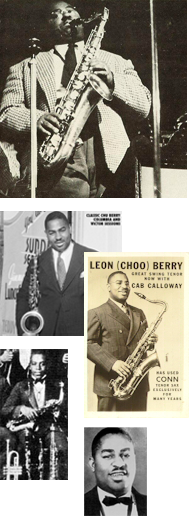Leon “Chu” Berry
1908-1941, Wheeling, Ohio County
During a recording and performing career that lasted scarcely more than a decade, Leon “Chu” Berry established himself as one of the world’s greatest tenor sax players. Many critics speculate that, had he not died in a car accident at the age of 33, Berry might have eclipsed his now-legendary peers Coleman Hawkins, Lester Young and John Coltrane.
Berry was born in Wheeling in 1908 to parents who encouraged his interest in music. His half-sister played piano in a jazz trio that practiced in their home inspiring Berry to begin exploring jazz. After hearing Coleman Hawkins in concert, Berry began playing alto sax – and became a musical standout at Wheeling’s Lincoln High School and West Virginia State College (now West Virginia State University).
In the late ’20s, Berry joined Sammy Stewart’s touring band and eventually settled in New York City where he became a key member of some of the greatest big bands of the 1930s – groups led by Benny Carter and Fletcher Henderson, for whom Berry wrote “Christopher Columbus,” Henderson’s last major hit. He also guested on recordings by Bessie Smith, Count Basie, Billie Holiday, Lionel Hampton, Teddy Wilson, and The Chocolate Dandies, a group led by fellow West Virginian (and 2009 WVMHoF inductee) Don Redman. But Berry was best known with his association with the colorful Cab Calloway, who came to think of Berry as a brother.
During this time, Berry traded alto for tenor sax, and his lightning fingers and powerful tone led the way for the bebop stars to come. He reportedly acquired the nickname, “Chu,” because the Asian cast of his features reminded his bandmates of a character from the musical Chu Chin Chow.
Berry’s mastery of advanced harmony and his smooth, flowing solos on up-tempo tunes influenced young innovators such as Dizzy Gillespie and Charlie Parker. Berry also took part in jam sessions at Minton’s Playhouse in New York City, which led to the development of bebop.
In 1937 and 1938, Metronome magazine named Berry to its All-Star Band, alongside such jazz immortals as Harry James, Benny Goodman, Ella Fitzgerald and Gene Krupa.
Berry died while on the way to Canada for a gig with Calloway’s orchestra, but he left behind some of the finest performances in jazz history. Despite a well-earned reputation as a speed merchant, the recording now considered one of his signature moments – a version of “Ghost of a Chance,” set down with Calloway’s band the year before his death – beautifully showcases his way with a ballad.
Berry perished on the brink of a musical revolution. Bebop would soon alter jazz forever, and those who came before including Hawkins, Young and Berry – did not always get enough credit for what they had helped bring about. Perhaps the most telling anecdote about Berry’s influence is that Charlie Parker – considered the saxophone’s greatest innovator – named his firstborn son Leon, in Berry’s honor.
